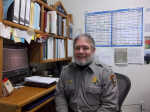From Air Force officer to teacher, park historian has varied resume

Fort Scott National Historic Site Historian Bill Fischer has a resume that reads like the old country song "I've Been Everywhere," along with a new one that he could write himself titled "I've Done Everything."
A retired Air Force officer, Fischer wears many hats at the site.
This is his first National Park Service job and he's not your typical NPS hire. Usually, rangers work seasonal jobs for years before coming on full time. "My path was very different. It was fortunate. I had a lot of learning to do when I got here," he said.
Fischer holds a degree in weather technology from the Community College of the Air Force, administratively based at Maxwell Air Force Base in Montgomery, Ala., and a bachelor's degree in natural resources from Ohio State University. He also has a bachelor's degree in history from the University of Montana at Great Falls and a master's in American history with an emphasis in military history from the University of Georgia in Athens.
He was on the faculty at the Air Force Academy in Colorado Springs, Colo., for three years and cross-trained to be an intelligence analyst. The Air Force sent him to earn a doctorate in history from Ohio State.
"Then 9/11 happened and I went back to intelligence," Fischer said.
A Philadelphia native, Fischer joined the Air Force out of high school and was stationed in Columbus, Ohio, as a weather specialist. He then got a job teaching American history and junior ROTC.
A little more than two years ago, Columbus schools cut about 500 teachers and saw deep program cuts, including football. Noting that his JROTC position was probably expendable, Fischer decided to look elsewhere and applied for the FSNHS position here.
"I've enjoyed being part of the National Park Service. I still have a lot to learn," not having come up through the ranks, Fischer said.
Along with serving as historian, Fischer is the compliance officer, museum custodial officer, liaison with the Kansas Department of Transportation for the Frontier Military Historic Byway and Freedom's Frontier and integrated pest management coordinator for the park.
Anytime improvements -- or pest control -- are planned at the site, he has to ensure the project is approved months in advance through the NPS regional office in Omaha.
Freedom's Frontier, an independent entity, includes 41 counties along the Kansas-Missouri border that tells the story of the border war and continuing struggle for freedom.
Wearing several different hats, as many of the park staff do, has Fischer jumping from one project to the next. "But I'm used to it from the military. I've been fortunate that a lot of people here have been here for years, so they can help me out," he said.
FSNHS has more than 100,000 archaeological pieces found during its redevelopment in the 1950s and '60s. "We have a lot of marbles. We also have several dozen rooms with exhibits," Fischer said. Museum Technician Ruth Walters is responsible for keeping the displays in presentable condition for visitors.
The building that houses Fischer's office, along with other park administrators, such as Park Superintendent Betty Boyko, was previously a museum run by the Business and Professional Women. The site itself was sold at auction in 1855 to become the town of Fort Scott.
"A lot of the original buildings were lost," Fischer said. "By the time the Civil War was over, it was a fairly large town."
Originally, there were four buildings on officers' row. Now there are three. Two big players in getting the site recognized were Professor Dudley Cornish at Pittsburg State University and U.S. Rep. Joe Skubitz.
Cornish had done research on black soldiers in the Civil War and Skubitz was administrative assistant to Sen. Clyde M. Reed from 1939 to 1949 and assistant to U.S. Sen. Andrew F. Schoeppel, serving from 1949-62, before being elected himself in 1962.
The fort operated for 11 years, but Fischer said it was a critical location during the Civil War. "It was the last bastion of the Union Army," he said. The 100th anniversary of the Civil War (1861-1865), the Civil Rights Act of 1964 and Cornish's books on African American regiments in the Civil War all combined to make it a perfect time to get a National Historic Site designation for FSNHS.
Initially, the site was going to be a city historic park with help from NPS. But it became clear in the 1970s that the operation would be too large for the city to handle. Congress agreed to have the park service take over and FSNHS became part of NPS in 1978, Fischer said.
The park is still changing with updated Civil War and Bleeding Kansas exhibits.
A new theater is planned for the second floor of one of the reconstructed infantry barracks and the whole interior is going to be revamped. "Hopefully that work will be done in the next couple of years," Fischer said.
Fischer and his wife, Sue, live in Fort Scott. He has three children -- two sons and a daughter. His sons, Henry and Nicholas, served four years in the Army.
Nicholas served a year -- and was wounded -- in Afghanistan and his daughter. Molly was in Afghanistan for six months.
Molly is a second lieutenant in the Ohio National Guard. Her husband, Josh, is a staff sergeant.
Fischer himself enlisted in the Air Force at age 17, with parental consent, and spent 22 1/2 years on active duty. He went in as an E-1 Airman and retired as a major.
He signed up because he wanted to get out of Philadelphia and knew the GI Bill would pay for college. Fischer served in Seoul, South Korea, Ottawa, Canada, and at a weather station in the Aleutian Islands, which he said were memorable for their isolation and high winds of 50-75 mph and unique wildlife.
